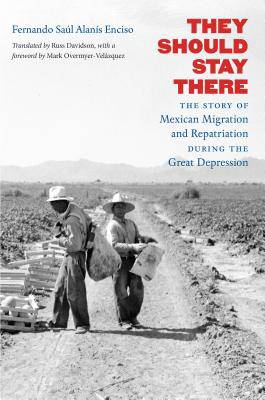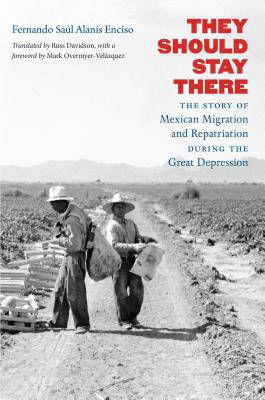
- Retrait gratuit dans votre magasin Club
- 7.000.000 titres dans notre catalogue
- Payer en toute sécurité
- Toujours un magasin près de chez vous
- Retrait gratuit dans votre magasin Club
- 7.000.000 titres dans notre catalogue
- Payer en toute sécurité
- Toujours un magasin près de chez vous
They Should Stay There
The Story of Mexican Migration and Repatriation During the Great Depression
Fernando Saúl Alanís Enciso
137,95 €
+ 275 points
Format
Description
Here, for the first time in English--and from the Mexican perspective--is the story of Mexican migration to the United States and the astonishing forced repatriation of hundreds of thousands of people to Mexico during the worldwide economic crisis of the Great Depression. While Mexicans were hopeful for economic reform following the Mexican revolution, by the 1930s, large numbers of Mexican nationals had already moved north and were living in the United States in one of the twentieth century's most massive movements of migratory workers. Fernando Saúl Alanís Enciso provides an illuminating backstory that demonstrates how fluid and controversial the immigration and labor situation between Mexico and the United States was in the twentieth century and continues to be in the twenty-first.
When the Great Depression took hold, the United States stepped up its enforcement of immigration laws and forced more than 350,000 Mexicans, including their U.S.-born children, to return to their home country. While the Mexican government was fearful of the resulting economic implications, President Lázaro Cárdenas fostered the repatriation effort for mostly symbolic reasons relating to domestic politics. In clarifying the repatriation episode through the larger history of Mexican domestic and foreign policy, Alanís connects the dots between the aftermath of the Mexican revolution and the relentless political tumult surrounding today's borderlands immigration issues.
When the Great Depression took hold, the United States stepped up its enforcement of immigration laws and forced more than 350,000 Mexicans, including their U.S.-born children, to return to their home country. While the Mexican government was fearful of the resulting economic implications, President Lázaro Cárdenas fostered the repatriation effort for mostly symbolic reasons relating to domestic politics. In clarifying the repatriation episode through the larger history of Mexican domestic and foreign policy, Alanís connects the dots between the aftermath of the Mexican revolution and the relentless political tumult surrounding today's borderlands immigration issues.
Spécifications
Parties prenantes
- Auteur(s) :
- Editeur:
Contenu
- Nombre de pages :
- 272
- Langue:
- Anglais
- Collection :
Caractéristiques
- EAN:
- 9781469634258
- Date de parution :
- 11-09-17
- Format:
- Livre relié
- Format numérique:
- Genaaid
- Dimensions :
- 156 mm x 234 mm
- Poids :
- 598 g







